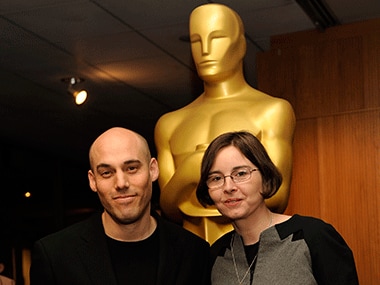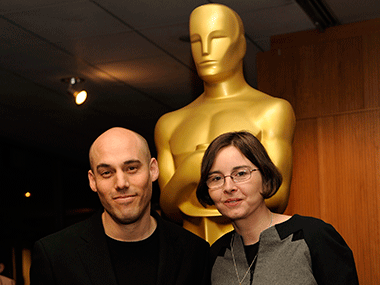The chilling documentary about one of the worst massacres since World War Two up for an Academy Award, to be held this weekend. However, if it does win, the Indonesian co-director has bigger things on his mind: he’s worried for his life. [caption id=“attachment_1412397” align=“alignleft” width=“380”]  Joshua Oppenheimer, director of the Oscar-nominated documentary film “The Act of Killing,” at a reception featuring the Oscar nominees in the Documentary Feature and Documentary Short Subject categories. AP.[/caption] “The Act of Killing” tells the story of one of the killers in Indonesia’s bloody purge of what was then the biggest communist party outside China and the Soviet Union. The nearly three-hour long documentary shows the remorseless way in which nearly 50 years ago, the killer dispatched his victims by strangling them with a loop of wire. The film touches on the darkest period of Indonesia’s already violent early years as an independent state, a discussion largely shunned from mainstream debate. The version in school textbooks still adhere to the line propagated by the autocratic leader Suharto who initiated the purge, and was forced to step down 15 years ago. At least 5 lakh people are thought to have died in the rampaging violence that started in late 1965, after the then-general Suharto and the military took power following an abortive communist coup. A million or more people were jailed. “It’s a tragedy and we, just like anybody else, despise those in the movie and the reenactment of the atrocities. These people don’t belong in Indonesia today,” said presidential spokesman Teuku Faizasyah. He added: “It requires a lot of revisiting but…I don’t think we are mature enough (yet) as a nation.” In a sign of how sensitive the topic remains, the Indonesian co-producer of the documentary and the other Indonesian members of the film crew say they do not want their names to be made public. “Maybe we are too paranoid, but we discussed with various activists groups about the risk, the possibility of going from a threat to a real attack on our lives, and we really don’t know what would happen if we revealed our names,” the co-director told Reuters in a telephone interview. Triggered in the midst of the Cold War when the West feared that communism was sweeping through decolonising Asia, much of the slaughter was in the populous main island of Java and the now-resort destination of Bali. Initially, it was the military that led efforts to crush the communist party. The operation was headed by a general, Sarwo Edhie Wibowo, the father of the country’s current first lady, and whose son is thought to have an eye on the presidency. The purging campaign mushroomed into an orgy of killing that saw the country’s biggest Muslim group, landowners, paramilitary organisations and those simply with a grudge against a neighbour, go after communist party members and their supposed sympathisers. Some observers worry the film does little to show the political context of the period, and the tension at the grassroot level between religious groups and landowners and the communists which was already seething before the attempted coup. “The issue is still divisive in society and nobody has ever really tried to reconcile,” said Agus Widjojo, a retired army lieutenant-general who heads a think-tank on policy and strategic issues. “Indonesian society is not brave enough to start the endeavour to face the truth of the past… But it’s the only way we can learn lessons about what we have done wrong and to correct it so that we can assure future generations of Indonesia that those mistakes will not be repeated.” For the film’s Indonesian crew, the anonymity will not end any time soon, according to the co-director. “Revealing our identities would need a genuine structural change in Indonesia… and that genuine reconciliation will take a long time, but the time to start that is now.” Reuters
While the documentary on the Indonesian purge may win the Oscar, co-director says that due to fears that he may be killed, he won’t take the stage
Advertisement
End of Article
Written by FP Archives
see more


)
)
)
)
)
)
)
)
)



